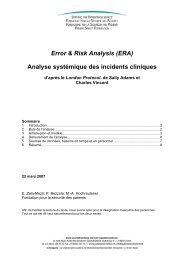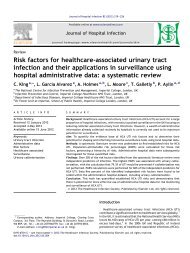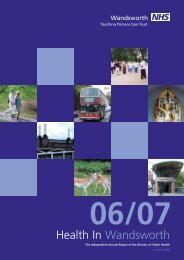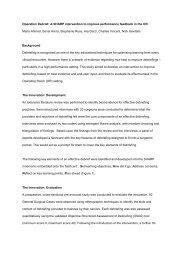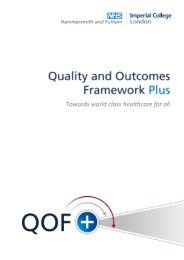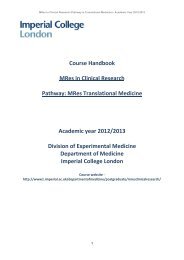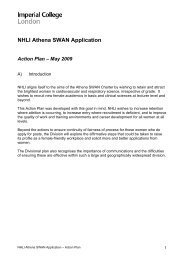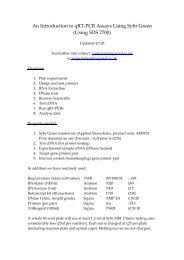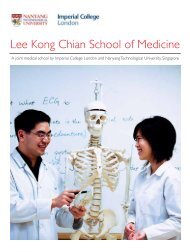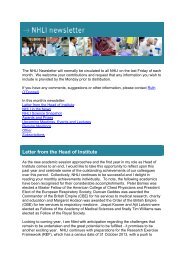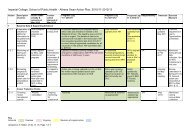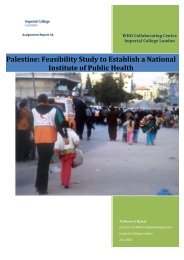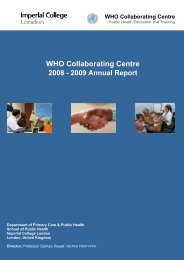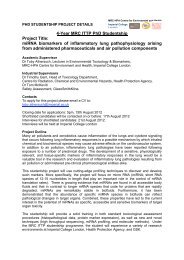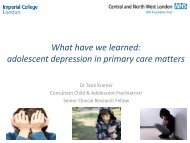APPLICANT - Imperial College London
APPLICANT - Imperial College London
APPLICANT - Imperial College London
You also want an ePaper? Increase the reach of your titles
YUMPU automatically turns print PDFs into web optimized ePapers that Google loves.
lecture programme and other related activities will be based mostly at the Hammersmith<br />
Hospital.<br />
Common features for the academic F2 programmes will include:<br />
• A named academic educational supervisor/mentor for the whole year. Trainees will be<br />
encouraged to meet with their academic supervisor well in advance of commencing their<br />
academic block. At the start of their academic attachment they will agree an academic<br />
personal development plan which would include exposure to research techniques,<br />
literature analysis, career advice on planning a career in research, grant funding etc.<br />
• Termly half day academic foundation programme teach-ins covering all areas of<br />
academic medicine.<br />
• Attendance at research meetings based around the academic department they are<br />
attached to.<br />
• Core lecture programme (example – changes each year)<br />
• Subcellular imaging<br />
• Neuroimaging with PET<br />
• Biomedical applications of magnetic<br />
resonance<br />
• Visualising protein structures<br />
• Patterning embryos<br />
• Epigenetics<br />
• Epistemology and philosophy of<br />
science<br />
• Microarrays<br />
• Transgenic technology<br />
• Bioinformatics<br />
• Ethical issues in clinical research<br />
• Molecular genetics<br />
• Translational medicine<br />
• Trainees will be encouraged to write a review article under the guidance of their<br />
academic mentor based on translational research potentially related to their academic<br />
attachment, aimed for publication. During this they will learn critical literature analysis<br />
techniques.<br />
• They will hopefully generate enough data from the 4 months laboratory or clinical<br />
research to contribute to a scientific paper. Clearly 4 months is not sufficient time to<br />
finish a project, but the time and work undertaken should have contributed significantly.<br />
• They will attend a dedicated one day academic training day covering clinical research<br />
and teaching skills (based at Chelsea and Westminster).<br />
• A regular evening programme of generic training will be established covering statistics,<br />
grant and paper writing, ethics, etc.<br />
• They will present their academic work at the NW Thames Academic Symposium in the<br />
July of their F2 year.<br />
Individuals will be working within routine busy clinical units and are expected to develop the<br />
same formal clinical F2 competencies as F2 doctors in non-academic posts within 8 months<br />
instead of the standard 12. They will have named clinical educational supervisors in each<br />
post who will ensure they address clinical skills in addition to the academic activity. All<br />
clinical posts have well established appraisal systems and ongoing educational support.<br />
www.stfs.org.uk/student/academic-programmes<br />
Email: tfsacademicrecruitment@stfs.org.uk<br />
Page 34 of 70<br />
Updated: 27 May 2010



